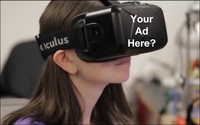
Move over, Google Glass.
Facebook announced on Tuesday it will acquire Oculus VR, maker of the Oculus Rift virtual reality headset, for $2
billion. The purchase includes $400 million in cash, 23.1 million shares of Facebook common stock, and a $300 million earn-out in cash and stock based on future performance.
Why is Facebook
buying a virtual reality firm? While applications for the technology have been mostly focused on games to date, the company said it plans to extend the uses to other areas, including communications,
media and entertainment, and education. Virtual reality, in other words, becomes the next-generation platform for social networking.
"Mobile is the platform of today, and now we're also
getting ready for the platforms of tomorrow," stated Facebook founder and CEO Mark Zuckerberg. "Oculus has the chance to create the most social platform ever, and change the way we work, play and
communicate."
In a post on his Facebook timeline, Zuckerberg said the company would initially focus on helping Oculus build out its product and develop partnerships to support more games. At
the same time, the company will continue to operate independently within Facebook.
“But this is just the start,” he wrote. “After games, we're going to make Oculus a platform
for many other experiences. Imagine enjoying a courtside seat at a game, studying in a classroom of students and teachers all over the world or consulting with a doctor face-to-face — just by
putting on goggles in your home.”
Oculus in December announced raising $75 million in a second-round funding led by Andreessen Horowitz; it had initially gained wider attention by
raising $2.5 million through Kickstarter. While a consumer version of the Rift has yet to be formally announced, the company suggested it has strong interest from developers, with more than 75,000
orders placed for development kits for the product.
“We believe virtual reality will be heavily defined by social experiences that connect people in magical, new ways. It is a
transformative and disruptive technology that enables the world to experience the impossible, and it's only just the beginning,” stated Oculus CEO Brendan Iribe.
The company has
competition. At the Game Developers Conference last week, Sony unveiled its own virtual reality headset called Project Morpheus, and also indicated the technology had a future beyond games, according
to a Re/code report.
Facebook said it expects the transaction to close in the second quarter. The
Oculus deal comes about a month after Facebook's $19 billion acquisition of WhatsApp.